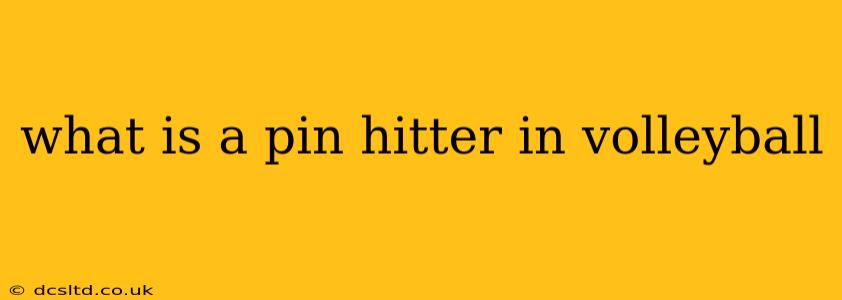A pin hitter in volleyball is a crucial offensive player, typically positioned on the left or right "pin" – the outside hitter positions closest to the antenna. They are responsible for a significant portion of a team's attack attempts and are often considered the focal point of the offensive strategy. Understanding their role requires looking beyond just hitting the ball; it encompasses a wide range of skills and strategic considerations.
What are the responsibilities of a pin hitter?
Pin hitters are more than just powerful hitters; they're all-around players. Their primary responsibilities include:
- Powerful and consistent attacks: They need to be able to deliver strong, accurate attacks from a variety of positions, aiming for gaps in the opposing team's block.
- Passing: Effective pin hitters are proficient passers, contributing to a strong first contact and reliable set for the team's attack.
- Blocking: They are part of the front-row block, aiming to disrupt the opponent's offensive plays. While their blocking responsibilities might be secondary to their hitting, a solid block adds significant defensive capabilities.
- Serving: Although not the primary focus, a reliable serve can be a huge asset.
- Digging: They often need to react quickly and effectively to digs, especially if the opponent's attack is directed towards their side of the court.
- Game awareness: Pin hitters need to anticipate the opponent's strategies and react accordingly, adjusting their attacks based on the block and defense they're facing. Their court awareness is vital for offensive success.
What skills are essential for a successful pin hitter?
A successful pin hitter needs a combination of athleticism and technical skills. Key skills include:
- Jumping ability: High vertical leap is essential to hit above the block.
- Arm swing: A powerful and efficient arm swing generates the force behind the attack.
- Precise hitting technique: Hitting the ball accurately and consistently into specific areas of the court requires mastery of hitting technique.
- Quick reflexes: The ability to react quickly to sets and defensive situations is crucial for quick offensive decisions.
- Strategic thinking: Pin hitters must understand game dynamics, opponents' weaknesses, and adjust their attacks accordingly.
What are the different types of pin hitter attacks?
Pin hitters utilize several attack options depending on the setter's placement and the opposing block:
- Line shots: Directed towards the sideline.
- Cross-court shots: Angled shots to the opposite side of the court.
- Quick attacks: Fast attacks executed quickly after the set.
- Roll shots: Soft, rolling shots that go over the opposing block.
- Tips: Deceptive, soft shots directed over or around the block.
How does the position of a pin hitter impact the game?
The pin hitter’s position near the sideline creates strategic advantages and challenges:
- Strategic Advantage: The position can create open hitting angles, allowing for more powerful attacks if the opposing block is not perfectly positioned.
- Strategic Challenge: The sideline limits hitting angles and makes precise shot placement crucial. One misplaced hit can easily go out of bounds.
What are some famous examples of pin hitters?
Many elite volleyball players have excelled as pin hitters. While specific names depend on the era and league, researching prominent players from various national teams and professional leagues (like the NCAA, professional leagues in Europe, etc.) will showcase many examples of exceptional pin hitters who have defined the position’s role.
How can I improve my pin hitting skills?
Improving your pin-hitting skills requires dedication and practice. Focus on:
- Regular training: Consistent practice is essential to develop strength, technique, and agility.
- Skill-specific drills: Practice specific skills like jumping, arm swing, hitting accuracy, and footwork.
- Game play: Playing regularly in matches or scrimmages will help you apply your skills in a game situation.
- Coaching: Guidance from a qualified coach can provide valuable feedback and accelerate your improvement.
Becoming a proficient pin hitter requires a comprehensive understanding of the game, dedication to practice, and the mastery of several essential skills. It's a demanding but rewarding role for those dedicated to excelling in volleyball.
